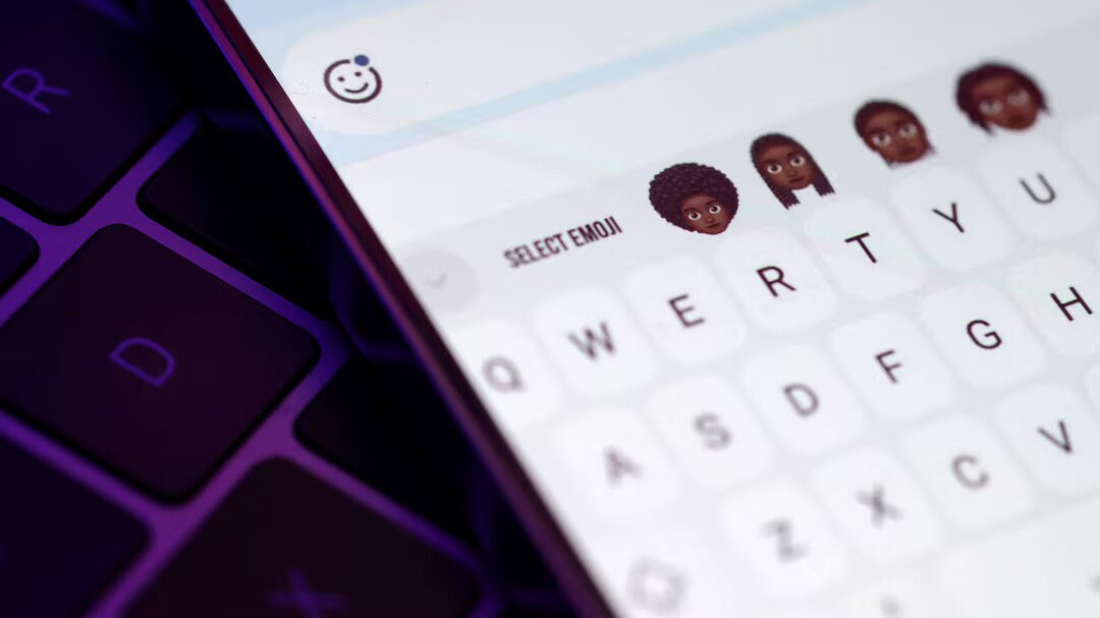Trump wants to be ‘involved’ in Iran’s next leader selection: All the latest news on the Middle East conflict
Trump tells Axios he wants direct involvement in who takes over as Iran's next leader, rejecting Khamenei's son as "unacceptable"...

A group of young entrepreneurs from London is creating the world’s first Afro hair emoji to promote diversity in beauty standards and represent Black and mixed-race hairstyles.
Aiming to break down beauty stereotypes and making the digital world more inclusive, a group of young students and professionals from London have designed what they hope will become the first ever emojis of Black and mixed-race hairstyles.
The project, a partnership between youth-led organisation RISE.365 and PR agency Good Relations, aims to tackle texturism, a form of discrimination where Afro hair is often perceived as "unprofessional", "unattractive" or "unclean".
There are nearly 4,000 emojis - symbols that represent human emotions or objects which are widely used in electronic messages - but none feature Black or mixed-race hairstyles. RISE.365 and Good Relations took matters into their own hands to change that.
A group of young people sketched what the emojis should look like, and then designers came up with the final product.
"It (emojis) would break down the society standards of your hair having to be straight to be seen as desirable," said Jayzik Duckoo, a 17-year-old who worked on the initial drawing of one of the emojis. "I hope people wear their hair proudly."
Four emojis were created featuring afros, braids, cornrows and locs. They will be submitted to Unicode, the California-based group responsible for emojis, in April 2025 for consideration.
Googling 'Afro hair' could help increase the chance of the emojis making the cut as one of the criteria when reviewing the submissions is frequency of use of the key term associated with the proposed symbols, RISE.365 said.
Olivia Mushigo was the senior creative behind the project, and said she hoped the emojis would make people "feel empowered and...actually seen".
The 28-year-old shared, “On a more personal note, I finally have an emoji that looks like me, that I can identify with."
A poll of RISE.365 members - a total of 104 respondents - showed 61% had experienced discrimination or bullying because of their hair. A 2023 study by the CROWN Research Studies showed 66% of Black women change their hair for a job interview.
Vanita Brown, who designed the emojis after consultation with the young people at RISE.365, said a reason why such emojis were still not available was due to Eurocentric beauty standards being seen as the norm.
In an exclusive interview with AnewZ, Iran’s Deputy Foreign Minister Kazem Gharibabadi said the Islamic Republic is "not targeting neighbouring countries," amid reports of drone strikes on Nakhchivan International Airport on Thursday (5 March).
Trump tells Axios he wants direct involvement in who takes over as Iran's next leader, rejecting Khamenei's son as "unacceptable" and citing the need for a figure who can bring "peace and harmony".
A torpedo from a U.S. submarine sunk an Iranian warship off the coast of Sri Lanka, U.S. Secretary of Defense, Pete Hegseth told reporters as the Iranian conflcit entered its fifth day on Wednesday.
Türkiye has suspended day-trip crossings at its Kapıköy border and two others with Iran as regional tensions escalate following strikes involving the United States and Israel on Tehran. AnewZ's Alisultan Sultanzade was on the ground at the crossing before the restrictions came into force.
Türkiye’s President Recep Tayyip Erdoğan has told Pakistan’s Prime Minister Shehbaz Sharif that Ankara is ready to help reinforce the ceasefire between Pakistan and Afghanistan, as clashes between the two neighbours continue for a sixth consecutive day.
Hindu devotees in the northern town of Barsana in Uttar Pradesh celebrated ‘Laddoo Holi’ on Tuesday (24 February), a traditional pre-Holi ritual honouring the Hindu deity Krishna.
Robert Carradine, best known for his roles in The Long Riders, Revenge of the Nerds and the television series Lizzie McGuire, has died at the age of 71 following a years-long battle with mental illness.
A seven-month-old Japanese macaque has drawn international attention after forming an unusual bond with a stuffed orangutan toy after being rejected by its mother.
Eric Dane, the actor best known for his roles in 'Grey’s Anatomy' and 'Euphoria', died on Thursday, at the age of 53 after a battle with amyotrophic lateral sclerosis (ALS). His family confirmed his death after what they described as a “courageous battle” with ALS.
Robert Duvall, the Oscar-winning actor renowned for his steely intensity and commanding performances in films including The Godfather and Apocalypse Now, has died at the age of 95.
You can download the AnewZ application from Play Store and the App Store.

What is your opinion on this topic?
Leave the first comment